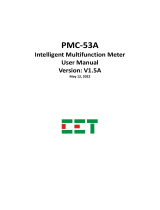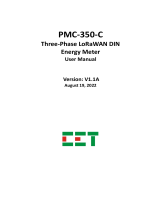Page is loading ...

BACNet Support
Branch Feeder Monitor
BFM136, BFMII
BACNet Communications Protocol
User Guide
BG0644 Rev. A1

2
Every effort has been made to ensure that the material herein is complete and
accurate. However, the manufacturer is not responsible for any mistakes in printing or
faulty instructions contained in this book. Notification of any errors or misprints will be
received with appreciation.
For further information regarding a particular installation, operation or maintenance of
equipment, contact the manufacturer or your local representative or distributor.
REVISION HISTORY
A0
Dec 2021
First edition
A1
Jan 2022
Published

3
Table of Contents
1 BACKGROUND ....................................................................................... 4
2 SATEC SUPPORT OF BN....................................................................... 5
3 SUPPORTED OBJECTS ......................................................................... 6
4 USER INSTRUCTIONS ........................................................................... 8

4
1 Background
BACNet is a standard protocol for handling access to vendor specific devices. The BN protocol
defines the behavior expected from controlling station and controlled devices. It is the
responsibility of the controlling station to detect devices that support BN in its network and
display all information provided by each device. It is the responsibility of vendor specific
devices to implement support for the BN protocol. The standard defines a wide variety of
types of support for the protocol. Each vendor decides what information it wants to share via
the BN protocol. All types of data are defined by the standard. The vendor, after initial
detection and identification with the controlling station, must return a list of ‘objects’
containing device specific data that it supports. Thereafter, the controlling station can
retrieve any part of the list of supported objects. Since the types of data are defined by the
standard, the controlling station is expected to display them accordingly. An essential aspect
of the BN protocol is the requirement that each device, in addition to providing objects with
values, it must describe, the meaning of the value provided. This includes object ID, name,
type, status etc.

5
2 SATEC Support of BN
The BN protocol defines various modes and ‘profiles’ for official support of standard.
SATEC supports the BSA profile:
Read
Write
Execute (answer) Who-Is
Initiate I-Am
And the following types of objects:
Analog Input (AI)
Command r/w
This the minimum to be classified as a standard BACNet device. It is need to be detected and
allow access to “Analog Input” objects per a predefined, fixed list (see exact list in following
chapters).
SATEC limits support to UDP over IP and does not support the routing mode (BBMD).
Since the BFM supports only one IP address, shared by all sub-meters, the BN browser will
detect only one BN instance per BFM device. By default, this will be the sub-meter with
address ID #1. To access other SM’s, the user must set the Command object value and send
to the BFM device. Thereafter, all requests for retrieval of AI objects will be directed to the
corresponding SM.

6
3 Supported Objects
Following table shows mapping between AI objects and Modbus Point ID’s:
AI Object ID
Point ID
Description
1
0x1100
V1 Voltage
2
0x1101
V2 Voltage
3
0x1102
V3 Voltage
4
0x1103
I1 Current
5
0x1104
I2 Current
6
0x1105
I3 Current
7
0x1106
kW L1
8
0x1107
kW L2
9
0x1108
kW L3
10
0x1109
kvar L1
11
0x110A
kvar L2
12
0x110B
kvar L3
13
0x110C
kVA L1
14
0x110D
kVA L2
15
0x110E
kVA L3
16
0x110F
Power factor L1
17
0x1110
Power factor L2
18
0x1111
Power factor L3
19
0x111E
V12 Voltage
20
0x111F
V23 Voltage
21
0x1120
V31 Voltage
22
0x1400
Total kW
23
0x1401
Total kvar
24
0x1402
Total kVA
25
0x1403
Total PF
26
0x1404
Total PF lag
27
0x1405
Total PF lead
28
0x1406
Total kW import
29
0x1407
Total kW export
30
0x1408
Total kvar import
31
0x1409
Total kvar export
32
0x1501
In (neutral) Current
33
0x1502
Frequency
34
0x1503
Voltage unbalance
35
0x1504
Current unbalance
36
0x1600
V1 Volt demand
37
0x1601
V2 Volt demand
38
0x1602
V3 Volt demand
39
0x1603
I1 Ampere demand
40
0x1604
I2 Ampere demand

7
41
0x1605
I3 Ampere demand
42
0x1609
kW import sliding window demand
43
0x160A
kvar import sliding window demand
44
0x160B
kVA sliding window demand
45
0x160F
kW import accumulated demand
46
0x1610
kvar import accumulated demand
47
0x1611
kVA accumulated demand
48
0x1612
kW import predicted sliding window
demand
49
0x1613
kvar import predicted sliding window
demand
50
0x1614
kVA predicted sliding window demand
51
0x1618
kW export sliding window demand
52
0x1619
kvar export sliding window demand
53
0x161A
kW export accumulated demand
54
0x161B
kvar export accumulated demand
55
0x161C
kW export predicted sliding window
demand
56
0x161D
kvar export predicted sliding window
demand
57
0x1700
kWh import
58
0x1701
kWh export
59
0x1704
kvarh import
60
0x1705
kvarh export
61
0x1708
kVAh total

8
4 User Instructions
Connect BFM device to IP network. Make sure it has a unique IP address
Open a BACNet browser/controller. It will discover all BFM BN devices that have a
unique IP address
By default, the browser will detect the first sub-meter for each device
All AO objects read will belong to the first sub-meter
For each device, the BN controller can retrieve data from each and every sub-meter by
configuring the Sub-Meter Selector Command Object
For an on-going process of retrieval of AO objects from all sub-meters, the controller
should apply the following logic
Assume ‘index’ that can be assigned value between 1 and 36 (54 for BFMII)
Start with index assigned value 1
– Set “Present Value” of the Sub-Meter Selector to value of ‘index’
– Retrieve all AO’s from the sub-meter (and store or display them)
– Increment index by 1 (if index > 36(54), set index to 1)
– Go to step ‘i’
4.1 Pictures of Demonstration with Freeware BN Browser, YABE
Open browser and choose network.

9
YABE detects all devices supporting BN on network. Choose one and YABE will bring it’s list
of AI objects:

10
Choose the command object and change from 1 to any other ID of sub-meter defined in BFM
and now all the AI objects will change accordingly.
/




